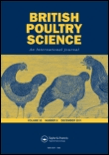
BRITISH POULTRY SCIENCE
Scope & Guideline
Connecting research and practice in poultry welfare.
Introduction
Aims and Scopes
- Poultry Nutrition and Feed Efficiency:
Research on dietary components, feed formulations, and nutritional supplements aimed at improving growth performance, feed conversion ratios, and overall health in poultry. - Poultry Health and Disease Management:
Investigation of infectious diseases, immunological responses, and health management strategies to enhance poultry welfare and productivity. - Genetics and Breeding:
Studies focusing on genetic diversity, breeding programs, and the genetic basis of economically important traits in various poultry species. - Animal Welfare and Behavior:
Research examining the impact of housing systems, environmental factors, and management practices on the welfare and behavior of poultry. - Food Safety and Quality:
Exploration of food safety issues, antimicrobial resistance, and quality control measures related to poultry products. - Innovative Technologies in Poultry Science:
Application of emerging technologies such as genomics, transcriptomics, and machine learning to address challenges in poultry production.
Trending and Emerging
- Sustainable Poultry Production:
Research focusing on environmentally sustainable practices, including alternative feed sources, waste management, and reduced reliance on antibiotics. - Microbiome Research:
Increasing emphasis on understanding the poultry microbiome and its interactions with host health, nutrition, and disease resistance. - Advanced Genetic Techniques:
Utilization of CRISPR, genome editing, and high-throughput sequencing technologies to enhance genetic research and improve breeding outcomes. - Poultry Welfare Assessments:
Growing interest in developing and validating welfare assessment tools that take into account physical and psychological well-being of poultry. - Nutritional Immunology:
Investigation into the relationship between nutrition and immune function, particularly how dietary components can enhance disease resistance and overall health. - Technological Innovations in Monitoring and Management:
Adoption of smart technologies, including sensors and data analytics, to monitor poultry health, behavior, and environmental conditions in real-time.
Declining or Waning
- Traditional Breeding Techniques:
Research on conventional breeding methods has diminished as more focus shifts towards genomic selection and advanced breeding technologies that promise faster and more precise outcomes. - General Animal Husbandry Practices:
Studies that cover basic animal husbandry practices without a specific scientific angle have decreased, as the field increasingly demands evidence-based approaches and innovations. - Non-Emerging Pathogen Studies:
Research on well-known pathogens that are not currently considered threats has waned, with more emphasis placed on emerging diseases and antibiotic resistance. - Basic Nutritional Studies:
While nutrition remains a key area, studies focusing on basic nutrient requirements without innovative applications or implications for health and growth are less frequently published. - Historical Perspectives on Poultry Production:
Papers focusing on historical analyses of poultry production practices are becoming less common, as the journal emphasizes contemporary research that addresses current challenges.
Similar Journals

Revista de Investigaciones Veterinarias del Peru
Fostering Knowledge, Enhancing Animal WelfareRevista de Investigaciones Veterinarias del Peru, published by UNIV NACIONAL MAYOR SAN MARCOS, stands as a pivotal resource within the field of veterinary sciences. With its ISSN 1682-3419 and E-ISSN 1609-9117, this journal aims to publish innovative research contributing to the advancement of veterinary practices and animal health. Since its inception in 1999, it has fostered an academic platform for professionals and researchers alike to share findings that are crucial for understanding and improving animal welfare in Peru and beyond. Although currently positioned in the Q3 category of Veterinary (miscellaneous) and ranked #163 out of 194 in the Scopus database, the journal's commitment to quality research and open access to veterinary knowledge continues to attract submissions and readership from a diverse audience. As it moves forward into 2024, the Revista de Investigaciones Veterinarias del Peru remains dedicated to disseminating critical insights that promote evidence-based practices in the veterinary field, stimulating further research and collaboration across continents.
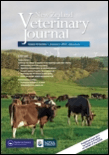
NEW ZEALAND VETERINARY JOURNAL
Connecting global discourse on animal health and welfare.NEW ZEALAND VETERINARY JOURNAL, published by Taylor & Francis Ltd, stands as a pivotal platform in the realm of veterinary science, contributing significantly to the global discourse on animal health and welfare since its inception in 1952. With an ISSN of 0048-0169 and an E-ISSN of 1176-0710, this journal offers invaluable insights within both the veterinary and general medical fields, currently achieving a commendable Q2 ranking in Veterinary (miscellaneous) and Q3 in Medicine (miscellaneous) for 2023. Its Scopus ranking places it in the 76th percentile among veterinary journals, affirming its high-impact presence in academia. While access to this journal is not open, it maintains an essential role for researchers, professionals, and students aiming to advance their knowledge and contribute to the field of veterinary science. With a commitment to disseminating quality research, NEW ZEALAND VETERINARY JOURNAL enriches the understanding of veterinary practices and enhances ongoing dialogue on critical health issues affecting animals, promoting better outcomes through scientific inquiry.

Brazilian Journal of Poultry Science
Driving discoveries in animal science and poultry genetics.Brazilian Journal of Poultry Science, an esteemed publication of FACTA-FUNDACIO ARNCO CIENCIA TECNOLOGIA AVICOLAS, serves as a pivotal resource for researchers and professionals in the field of poultry science. Since its inception in 2000, the journal has maintained a commitment to Open Access, ensuring that high-quality research is accessible to a global audience. Based in Brazil, the journal provides a platform for innovative studies and advancements in animal science and zoology, achieving a commendable Q3 category ranking in 2023 and occupying the 270th position in Agricultural and Biological Sciences according to Scopus metrics. With a focus on disseminating robust scientific findings, the journal enhances understanding of poultry production, welfare, and genetics, crucial for the increasingly essential food production sector. Published continuously from 2002 to 2024, it remains dedicated to fostering knowledge exchange, supporting academic growth, and addressing the challenges faced by the poultry industry.
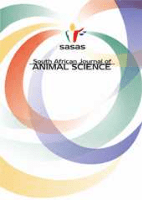
SOUTH AFRICAN JOURNAL OF ANIMAL SCIENCE
Connecting South African insights with global animal science.SOUTH AFRICAN JOURNAL OF ANIMAL SCIENCE is a leading scholarly publication dedicated to the dissemination of original research, review articles, and critical insights in the fields of animal science and zoology. Established in 1974, this journal is published by the South African Journal of Animal Sciences and has since become an essential resource for researchers and professionals in the field. The journal, which currently holds a Q3 ranking in Animal Science and Zoology as per Scopus rankings, aims to promote scientific knowledge and innovation in animal husbandry, welfare, nutrition, and breeding practices, with a particular emphasis on the South African context. The journal's rigorous peer-review process ensures high-quality research is shared widely among the academic community. Researchers and students alike will find valuable content and access options that support ongoing education and professional development in this vital area of study. For more information, interested readers can contact the editorial office at PO Box 13884, Hatfield 0028, South Africa.

Indian Journal of Animal Research
Elevating Knowledge in Animal Research Since 2008Indian Journal of Animal Research is a prominent publication in the field of animal science and veterinary medicine, established to advance the understanding of animal husbandry, biology, and health. Published by the AGRICULTURAL RESEARCH COMMUNICATION CENTRE, this journal has been contributing to the scholarly discourse since 2008, with a commitment to high-quality research dissemination. With its current Q3 ranking in both Animal Science and Zoology and Veterinary (miscellaneous) categories, it serves as a crucial platform for researchers aiming to share insights and innovations within these disciplines. Although it operates without open access, it remains widely recognized, fostering a collaborative academic environment. The journal's impact is underscored by its presence within the Scopus database, providing valuable rankings in both General Veterinary and Animal Science and Zoology fields. Researchers, professionals, and students interested in veterinary advancements and animal research will find this journal a valuable resource for the latest scientific findings and discussions. Join the community of scholars igniting progress in the vital realm of animal research.

TROPICAL ANIMAL HEALTH AND PRODUCTION
Unveiling breakthroughs in tropical animal welfare.Tropical Animal Health and Production is a prominent academic journal dedicated to advancing the field of animal health and production in tropical environments. Published by Springer, this journal has been a pivotal platform for researchers and professionals since its inception in 1969, serving as a vital resource for innovative studies and advancements up to 2024. With impactful research findings, it holds a respectable Q2 ranking in both Animal Science and Zoology, and Food Animals, demonstrating its significance within these fields. The journal’s commitment to high-quality research is further reflected in its Scopus rankings, with a notable position in Agricultural and Biological Sciences and Veterinary Food Animals. Although it is not an open-access publication, the insights and knowledge shared within its pages are invaluable for those engaged in tackling the challenges of animal health and production in the tropics. Researchers and students will find Tropical Animal Health and Production an essential source for the most recent advancements and practices in veterinary science and animal care for food-producing species.
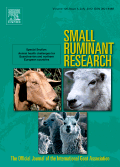
SMALL RUMINANT RESEARCH
Unlocking the potential of small ruminants through rigorous study.SMALL RUMINANT RESEARCH is a premier academic journal committed to advancing the field of animal science, specifically focusing on the study and management of small ruminants. Published by Elsevier, this esteemed journal holds a significant standing, ranked in the Q2 category for both Animal Science and Zoology as well as Food Animals in 2023, reflecting its influence and relevance in the academic community. With an ISSN of 0921-4488 and an E-ISSN of 1879-0941, it disseminates high-quality research that encompasses a wide spectrum of topics, including nutrition, genetics, health, and management practices for sheep and goats. Although it does not offer open access, the journal ensures rigorous peer review and publishes articles that aim to bridge research gaps and promote best practices among industry practitioners. With its contribution to knowledge spanning from 1988 to 2024, SMALL RUMINANT RESEARCH serves as an essential resource for researchers, practitioners, and students dedicated to the enhancement of small ruminant production and welfare.

Poultry Science Journal
Bridging the gap between research and practical application in poultry science.Poultry Science Journal, with the ISSN 2345-6604 and E-ISSN 2345-6566, is an esteemed publication spearheaded by Gorgan University of Agricultural Sciences & Natural Resources since its transition to Open Access in 2013. Based in Iran, this journal serves as a vital platform for disseminating cutting-edge research and innovative advancements in the fields of Animal Science and Food Animals. With a current impact reflected in its Q3 quartile ranking within its categories and Scopus ranks indicating a competitive standing among peers, the journal plays a crucial role in enhancing the academic discourse surrounding poultry science. Researchers, professionals, and students alike are encouraged to engage with the journal’s high-quality content, which encompasses diverse topics including poultry genetics, nutrition, health, and welfare, thereby contributing to the improvement of poultry production practices globally. The journal’s commitment to accessibility ensures that valuable findings are readily available to the scientific community, fostering collaboration and advancing research in this essential domain of agricultural science.
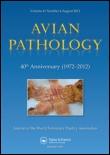
AVIAN PATHOLOGY
Elevating veterinary science through pioneering avian studies.AVIAN PATHOLOGY is a leading academic journal published by Taylor & Francis Ltd, focusing on the field of avian health, diseases, and diagnostics. With an ISSN of 0307-9457 and an E-ISSN of 1465-3338, this esteemed journal has been serving the scientific community since its inception in 1972, with content converging until 2024. Notably recognized in the 2023 Journal Rank, it holds a Q1 category in Animal Science and Zoology, making it an essential source for researchers and practitioners alike. The journal emphasizes critical insights into avian pathology, fostering significant advancements in veterinary science and poultry health management. Although it is not open access, subscriptions provide access to high-impact reviews and original research that underpin vital practices in the industry. With its prestigious publishing lineage and impactful scope, AVIAN PATHOLOGY continues to be a cornerstone for those dedicated to understanding and improving the health of avian species worldwide.

Revista Colombiana de Ciencias Pecuarias
Fostering Collaboration in Veterinary and Agricultural AdvancementsRevista Colombiana de Ciencias Pecuarias, an esteemed publication in the field of Animal Science and Veterinary Studies, is published by the Universidad de Antioquia, Faculty of Agricultural Sciences. Since its inception in 1996, this Open Access journal has become a vital resource for the dissemination of research and advancements within the agricultural and biological sciences, specifically targeting the veterinary and animal husbandry sectors. Situated in Colombia, its mission is to support and promote scientific knowledge through rigorous review processes and high-quality articles. The journal’s recent classification includes Q4 in Animal Science and Zoology and Q3 in Veterinary categories, illustrating its commitment to enhancing its scientific impact. As it converges from 2008 to 2024, this journal aims to engage researchers, professionals, and students alike, establishing a collaborative environment for innovative research and findings that shape the future of animal sciences globally.